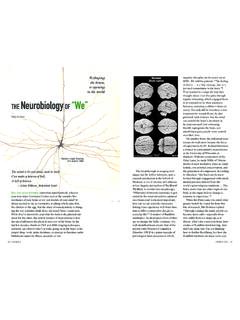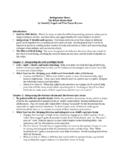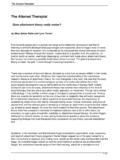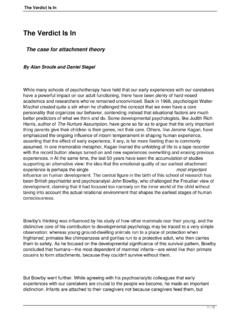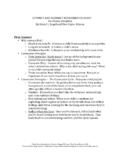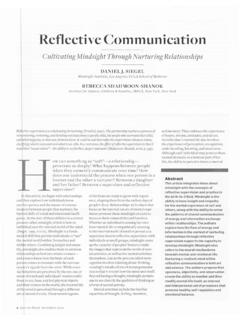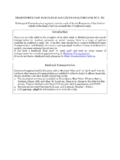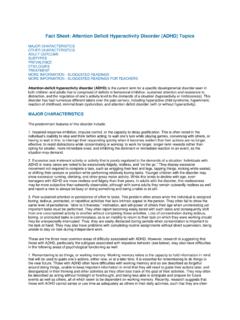Transcription of Mind, Brain, and Relationships
1 Copyright 2012 The Guilford Press This is a chapter excerpt from Guilford Publications. The Developing Mind: How Relationships and the Brain Interact to Shape Who We Are, Second Edition. By Daniel J. Siegel. Copyright 2012. Purchase this book now: chAPteR 1 Mind, Brain, and Relationships The Interpersonal Neurobiology Perspective The mind is rarely defined in fields that focus on mental experience. This avoidance may be due to any of several well-considered reasons. There is the understandable philosophical stance that definitions may restrict a full understanding, or the notion that the mystery of the mind makes us unable to characterize its defining features.
2 Sometimes the word mind is used as a placeholder for the unknown, a marker of this mysterious source of our sub jective inner life. In this book, I honor these positions while taking the risky step of exploring a working definition of the mind that has been of great value in understanding how our lives develop and what a healthy mind may actually be. After all, if we do not attempt to define at least a core aspect of the mind itself, how can we state what might constitute a healthy mind?
3 This book explores how recent findings from a range of sciences can bring us to a new understanding of the developing mind. The sciences give us many views of how the mind functions, providing in-depth but distinct perspectives on human experience. For example, neuroscience can inform us about how the brain gives rise to mental processes such as memory and per ception. Developmental psychology offers us a view of how children s minds grow within families across time. Anthropology gives us insights into how relational experiences and communication patterns within different cultures directly shape the development of the mind.
4 Psychiatry gives us a clinical view of how individuals may suffer from emotional and behavioral distur bances that profoundly alter the course of their lives. Often these disciplines function in isolation from one another. Yet when one attempts to synthesize their recent findings, an incredible convergence of many independent fields of study is revealed. This convergence can be called consilience the dis covery of common findings from independent These findings shed light on how the mind emerges from the substance of the brain and is 1 Copyright 2012 The Guilford Press 2 T H E D E V E L O P I N G M I N D shaped by our communication within interpersonal Relationships .
5 My aim is to provide an overview and integration of some of these scientific per spectives, which serve as a foundation for a neurobiology of interpersonal experience. More specifically, to help you to understand the developing mind, I provide an integration of mental processes (such as memory and emo tion) with both neurobiology (such as neural activity in specific circuits) and interpersonal Relationships (such as patterns of communication).
6 This integration is indeed the challenge of the book, both in the writing and in the reading. My concern is with those who, like many of my past students, are new to neurobiology; the unfamiliar ideas and vocabulary may initially feel too overwhelming to continue. Numerous teaching experiences, how ever, have demonstrated that the outcome is worth the effort. I have tried to include enough of a background as the chapters evolve that each topic can be understood by those who may be totally unfamiliar with a given area.
7 No prior expertise is required. New concepts and vocabulary are inevi table, but I have tried to incorporate information throughout the book in a user-friendly manner, summarizing the significance of certain findings and including reminders of certain trends as they recur in the book. What ever your personal, scholarly, or professional pursuits, you will have a better understanding of unpredictable experiences after having studied this mate rial. Learning this approach will support the scientific view that chance favors the prepared mind, in that your own mind will be prepared with this integrative perspective to understand and respond to what arises in life.
8 There are many readily accessible concepts and much useful information just below the surface of these sometimes new names and ideas. A shared under standing from the beginning will help you in making sense of the intricate and exciting findings about interpersonal Relationships and the developing mind. For those who are charting new waters, I welcome you to the exciting world of interdisciplinary study! DEFInInG THE MInD Here is a definition of the mind that enabled dozens of scientists to communi cate with one another about the mind: A core aspect of the mind is an embodied and relational process that regulates the flow of energy and information.
9 In the begin ning of the Decade of the Brain, the 1990s, I offered this working definition to a group of over forty scientists in order to find a common starting place for us to address the connection between the mind and the brain. With this view, all of the researchers from anthropologists to neuroscientists could find a common way of describing each discipline s way of exploring the nature Copyright 2012 The Guilford Press 3 Mind, Brain, and Relationships of reality. Energy and information flow is what is shared among people within a The mind is an embodied and relational process that regulates the culture, and this flow is what is measured flow of energy and information.
10 In subjects within a brain scanner. In this working definition, we also found a way to meet for over four years, sharing our various perspectives on the nature of what it means to be human. It was in the fertile soil of this gathering that the seeds of the interdisciplinary field that ultimately became interpersonal neurobiology (IPNB) were first sown. IPNB embraces everything from our deepest relational connections with one another to the synaptic connections we have within our extended nervous systems.
